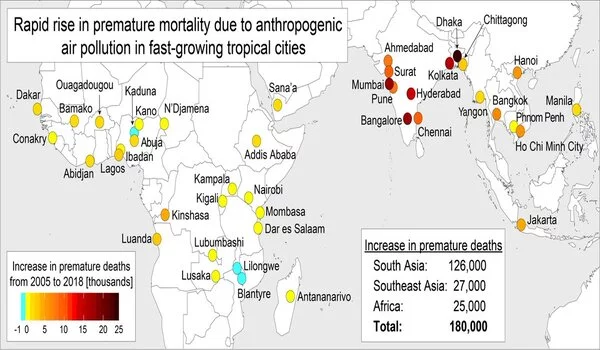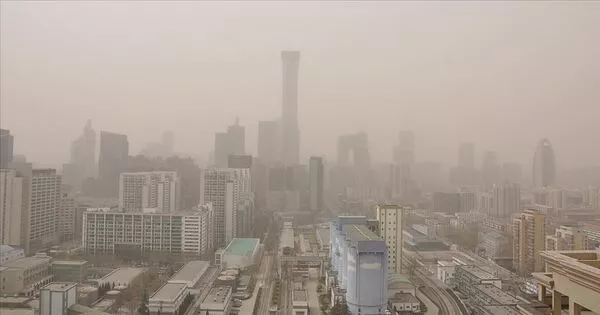According to a report, air pollution in tropical cities is responsible for 180,000 deaths.
According to a new study, a quick spike in rising air pollution caused approximately 180,000 unnecessary deaths in fast-growing tropical towns over the last 14 years.
Rapid degradation in air quality and increases in urban exposure to air pollutants are identified as corridors of health concerns, according to a paper published by the University College London in Science Advances on Friday, April 8, 2022.
The researchers blamed growing industry and household sources like road traffic, garbage burning, and widespread use of charcoal and fuelwood for the rapid decline in air quality.
The study’s tropical cities were found in Africa, South Asia, Southeast Asia, and the Middle East.

They were as follows:
Abidjan, Abuja, Addis Abeba, Antananarivo, Bamako, Blantyre, Conakry, Dakar, Dar es Salaam, Ibadan, Kaduna, Kampala, Kano, Khartoum, Kigali, Kinshasa, Lagos, Lilongwe, Luanda, Lubumbashi, Lusaka, Mombasa, N’Djamena, Nairobi, Niamey, Ouagadou
South Asia includes Ahmedabad, Bangalore, Chennai, Chittagong, Dhaka, Hyderabad, Karachi, Kolkata, Mumbai, Pune, and Surat.
Bangkok, Hanoi, Ho Chi Minh City, Jakarta, Manila, Phnom Penh, and Yangon are among the cities.
Riyadh and Sana’a are in the Middle East.
The authors discovered significant annual increases in pollutants directly hazardous to health of up to 14% for nitrogen dioxide and up to 8% for fine particles across all of these cities, as well as increases in precursors of the same fine particles of up to 12% for ammonia and up to 11% for reactive volatile organic compounds.
In the past, open burning of biomass for land clearance and agricultural waste disposal dominated air pollution in the tropics.
“Open burning of biomass for land clearance and agricultural waste disposal has in the past overwhelmingly dominated air pollution in the tropics. Our analysis suggests we’re entering a new era of air pollution in these cities, with some experiencing rates of degradation in a year that other cities experience in a decade.”
Lead author Dr. Karn Vohra (UCL Geography)
Our data implies we’re approaching a new era of air pollution in these places,” said lead author Dr Karn Vohra, who completed the study as a PhD student at the University of Birmingham.
According to the study, the number of premature fatalities from air pollution exposure surged in South Asian cities, particularly Dhaka, Bangladesh (totaling 24,000 deaths) and the Indian cities of Mumbai, Bangalore, Kolkata, Hyderabad, Chennai, Surat, Pune, and Ahmedabad (totalling 100,000 deaths).
Despite the lower rate of deaths examined in Africa’s tropical cities as a result of recent improvements in healthcare across the continent, resulting in a decrease in overall premature mortality, researchers predicted that the effects of air pollution on health would likely worsen in the coming decades.
Rather than learning from past mistakes and ensuring that fast industrialisation and economic expansion do not affect public health, we continue to move air pollution from one place to the next. “We hope that our findings will encourage preventative action in the tropics,” said co-author Dr. Eloise Marais.
According to the PUNCH, this study supplements the World Health Organization’s most current report, which was released on Monday, April 4, 2022, just in time for World Health Day.
According to the PUNCH, 99 percent of the world’s population breathed air that exceeded the allowed quality standards, creating major health risks.
According to the WHO’s analysis of over 6,000 cities in 117 countries where air quality was monitored, the inhabitants of these cities were still unknowingly breathing unhealthy levels of fine particulate matter and nitrogen dioxide, with people in low and middle-income countries being even more vulnerable to the highest levels of exposure.
“It is inexcusable that, after surviving a pandemic, there are still seven million needless deaths and countless unnecessary years of good health lost owing to air pollution.”
That’s what we’re saying when we look at the mountain of data, evidence, and solutions available on air pollution. However, too many investments are still being made in a polluted environment rather than in clean, healthy air, said Dr Maria Neira, WHO Director, Department of Environment, Climate Change, and Health, in a report released earlier this week.





